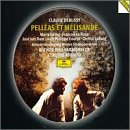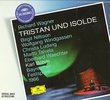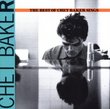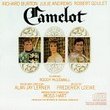| All Artists: Claude Debussy, Claudio Abbado, Maria Ewing, François Le Roux, Wiener Philharmoniker, José van Dam, Christa Ludwig, Patrizia Pace, Rudolf Mazzola Title: Debussy - Pell�as et M�lisande / M. Ewing � Le Roux � van Dam � Courtis � Ludwig � Wiener Phil. � Abbado Members Wishing: 0 Total Copies: 0 Label: Dg Imports Release Date: 11/10/1992 Album Type: Import Genre: Classical Style: Opera & Classical Vocal Number of Discs: 2 SwapaCD Credits: 2 UPC: 028943534420 |
Search - Claude Debussy, Claudio Abbado, Maria Ewing :: Debussy - Pell�as et M�lisande / M. Ewing � Le Roux � van Dam � Courtis � Ludwig � Wiener Phil. � Abbado
 | Claude Debussy, Claudio Abbado, Maria Ewing Debussy - Pell�as et M�lisande / M. Ewing � Le Roux � van Dam � Courtis � Ludwig � Wiener Phil. � Abbado Genre: Classical
|
Larger Image |
CD DetailsSimilar CDsSimilarly Requested CDs |
CD ReviewsReally good, but... 12/14/1999 (4 out of 5 stars) "If Boulez's laserdisc account (DG) didn't exist, I would probably say that Abbado's is the best account that I've heard. It is certainly very, very good -- lots of atmosphere and passion, and absolutely gorgeous playing from the Vienna Philharmonic. However, there are a lot of things Abbado does that does not necessarily benefit the music -- the syncopated chords (depicting the dying Melisande's faltering breath) in the beginning of Act V are smoothed over so that one hears them only as long sustained chords. A lot of orchestrational detail is lost in Abbado's generally "fat" conducting. And the recording has a little bit too much reverb (which doesn't help the already not-too-clear performance). The cast is quite divine -- Le Roux is a little bit too nasal sounding to me, but I quickly got used to him. Ewing's tone is just a tad bit too rich for my taste. I prefer Boulez's cast -- he has a more pure-toned Melisande (Alison Hagley) and a better characterized Pelleas (Neill Archer). And, of course, Boulez's clarity is the very opposite of Abbado's murk. Alas, I believe Boulez's performance (the one on laserdisc) is out of print. I don't like Boulez's first version (Sony) -- it's not as clear, and the cast is not at all good. If you really want a Pelleas now, you could do worse than purchasing this set (Karajan's recording is even more fat than this, and is to be avoided!). I hope DG decides to re-release Boulez's recording on CD. I love this opera a lot, but I must say that, despite Abbado's fine performance, I would still not purchase this set simply because I know that there are too many things in this incomparable score that Abbado misses." TOO DEEP FOR TEARS DAVID BRYSON | Glossop Derbyshire England | 05/04/2006 (5 out of 5 stars) "Debussy's great Pelleas et Melisande is not really a music-drama, much less an opera, in any familiar sense. It is more a book sung rather than read. The text is prose - quite simple prose at that - and so far as I know it is lifted straight from Maeterlinck's play. The music is as continuous as Wagner without relying on Wagner's special device of Leitmotiv, sc musical phrases with specific associations. The vocal idiom is a kind of constant recitative, and it is innocent of anything we would normally call melody from start to finish. That, on my view of the work, is how it must be - when singing a prose text tunes would be out of place. Again, I can think of no opera or music-drama that makes its effect so completely in sound alone, indeed that is how I prefer it. There may be no tunes, but there is infinite `atmosphere' to this music. It does not even `illustrate' its text, it fuses with it to form a single indivisible unity. It is toweringly great music in my opinion, but it has no existence apart from the narrative of which it has become a part. Maeterlinck belongs to the school of French writers normally called `symbolist', and indeed there is symbolism enough in his story to keep the literary criticism industry going for centuries. The story captured the attention of other great composers too. It drew from Sibelius some attractive but lightweight incidental music, and Schoenberg was moved, alas, to depict it in a tone-poem of excruciating length and turgidity. Debussy was born, it seems, to give this deep and disturbing story its true and worthy musical representation. It is a depthlessly sad story, but on one level it is a very realistic one. The behaviour of Golaud and Pelleas is very recognisable indeed, and if the old king Arkel is as much a kind of Greek chorus in his comments as a kind of Nestor, the child Yniold is a very familiar type of French child. Melisande herself is the figure of mystery and contradictions. We never even find out where she came from - she was found crying in a forest like Coleridge's Geraldine, the victim apparently of unspecified wrongs done by unnamed wrongdoers. She is not a witch like Geraldine, but she precipitates the tragedy and she is a liar. She lies to Pelleas about the behaviour of Golaud when he found her (he was an impeccable gentleman), she lies to Golaud about the loss of her wedding-ring, and when she tells Pelleas that she only lies to Golaud that is itself a lie. However not only Golaud but Arkel too think of her as childlike, and indeed the developing passion in her relationship with Pelleas seems to come mainly from his side. Her death itself may have been the result of giving birth, although nobody suggests that, rather than a tragic event like the death of Desdemona. This is not a Shakespearean tragedy in any way, nor even a Greek-style one. The frequent references to fate are something else entirely here - this is just what can happen to people in certain situations. Such is the power of the music that I prefer it all without stage action. Debussy creates a world of his own, and the performers here rise to it superbly. The trumpets surely sounded on the other side for Abbado and the Vienna Philharmonic for their superb realisation of this wonderful score, steering clear of hyperbole but without artificial coldness or restraint either. The singers seem to me without exception excellent. I am not myself a singer in any meaningful sense of the word, but I would guess that in technical terms Debussy's vocal writing is much less difficult than Wagner's to say nothing of Verdi's. Be that as it may, it calls for artistry and sensitivity of an exceptional order, and I hope I never have to revise my early impression that it is all something near flawless. The recording, from 1991, is just right to my ears too, and even the liner notes are outstandingly good. Maeterlinck's French is very simple, and I only glanced at the translation now and again. So far as I noticed, it was generally good, except that I spotted one howler - `le pont' on a ship is not the bridge but the deck. Would a sailing-ship have a bridge anyway? I also thought it rather a pity to downgrade Maeterlinck's vivid and memorable `l'haleine de la mort' to the dull and conventional `the shadow of death'. How much general appeal this great work will ever have is something I have no means of knowing. I have not even attempted in a short review to touch on the matter of the symbolism that lies at its heart. If you are new to it, all I would say is that to have any hope of understanding it you must follow the text with undeviating attention, and it is in no way difficult to follow. It is not a thing to tug at your heart-strings in an ordinary sense, but it is as deep as the fountain in the park or the pools in the cave, and after hearing an account as fine as this one is it should take you some time to become the person you were before, if indeed you ever do." Delicious! DAVID BRYSON | 09/03/1999 (5 out of 5 stars) "What else needs to be said? Maria Ewing is amazing, sexy, sensual,Le Roux is also youthful, vibrant, and Abbado is at his best!"
|

 Track Listings (19) - Disc #1
Track Listings (19) - Disc #1








